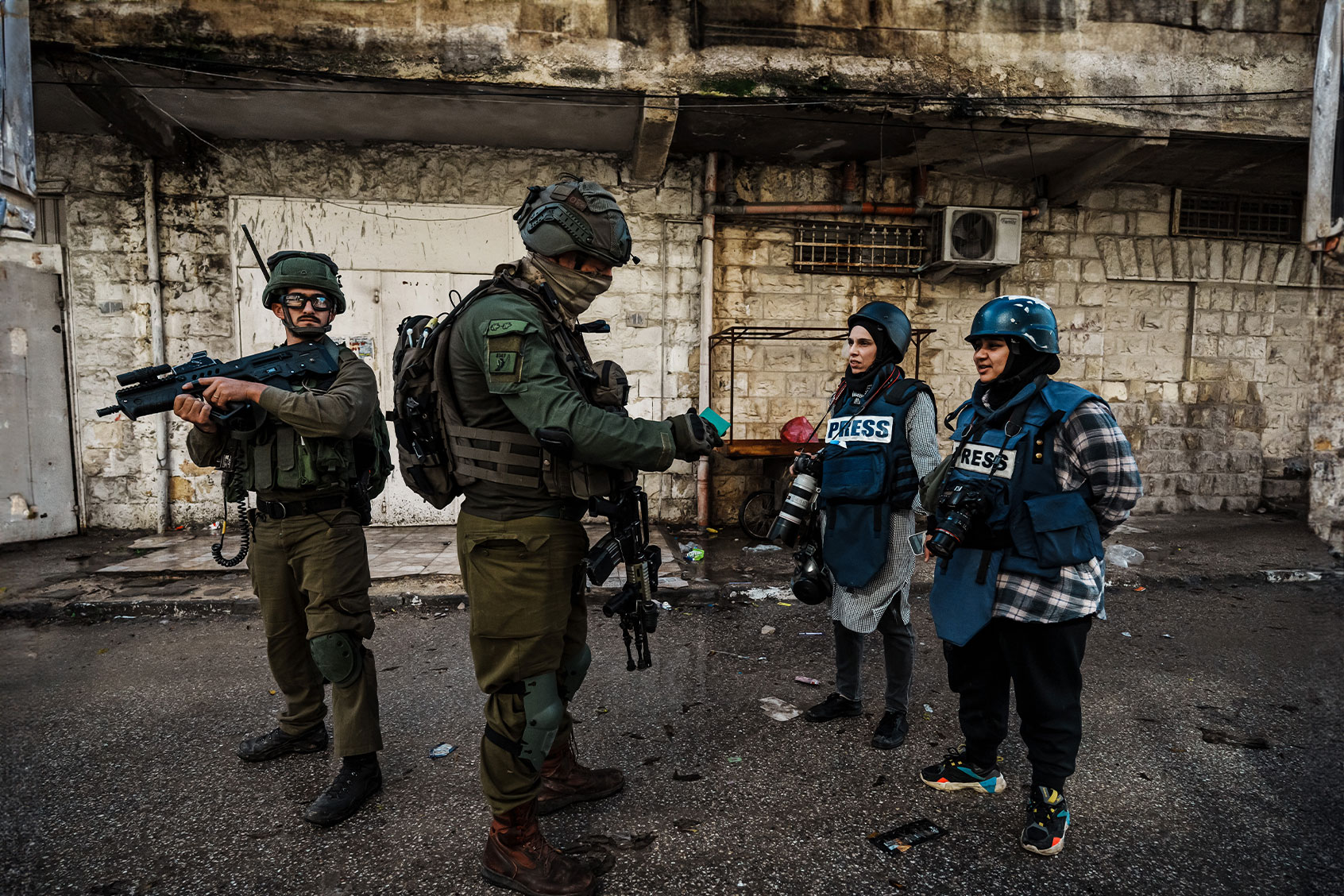Zen wisdom tells us that the finger pointing at the moon is not the moon. Yet it’s easy to fall into the illusion that when we see news about the Gaza war, we’re really seeing the war.
We are not.
What we do routinely see is reporting that’s as different from the actual war as a pointed finger is from the moon.
The media words and images reach us light years away from what it’s actually like to be in a war zone. The experience of consuming news from afar could hardly be more different. And if we hold beliefs or unconscious notions that media outlets are conveying war’s realities, that only ends up obscuring those realities all the more.
Inherent limitations on what journalism can convey are compounded by media biases. In-depth content analysis by the Intercept found that coverage of the Gaza war by the New York Times, Washington Post and Los Angeles Times “showed a consistent bias against Palestinians.” Those highly influential papers “disproportionately emphasized Israeli deaths in the conflict” and “used emotive language to describe the killings of Israelis, but not Palestinians.”
What is most profoundly important about war in Gaza — what actually happens to people being terrorized, massacred, maimed and traumatized — has remained almost invisible for the U.S. public. There is extensive coverage, most of it superficial and repetitious, as rising death numbers come to seem normal and Gaza becomes a routine topic in news media. And yet, what’s going on now in Gaza is “the most transparent genocide in human history,” in the words of Richard Falk, former U.N. special rapporteur on human rights in Palestine.
With enormous help from U.S. media and political power structures, the ongoing mass murder — by any other name — has become normalized, mainly reduced to standard buzz phrases, weaselly diplomat-speak and euphemistic rhetoric about the Gaza war. Which is exactly what the top leadership of Israel’s government wants.
Israeli authorities' extraordinary determination to keep killing civilians and destroying what little is left of Palestinian infrastructure in Gaza has caused extremes of hunger, displacement, destruction of medical facilities, and expanding outbreaks of lethal diseases. All of this has obviously been calculated and sought by Israeli leaders. While the calamity facing 2.2 million Palestinian people in Gaza is thinly reported by U.S. media outlets, as well as cravenly dodged by President Biden and the overwhelming majority of Congress, it worsens by the day.
“Gazans now make up 80 per cent of all people facing famine or catastrophic hunger worldwide, marking an unparalleled humanitarian crisis in the Gaza Strip amid Israel’s continued bombardment and siege,” the U.N. declared this week. The statement quoted experts who said: “Currently every single person in Gaza is hungry, a quarter of the population are starving and struggling to find food and drinkable water, and famine is imminent.”
We need your help to stay independent
Israel is waging a war toward extermination. But for the vast majority of Americans, no matter how much mainstream media they consume, the war that actually exists — in contrast to the war reporting by news outlets — remains virtually invisible.
Of course the murderous attack on civilians by Hamas on Oct. 7, and the group's taking of hostages, should be unequivocally condemned as crimes against humanity. Such condemnation is fully appropriate, and easy in the United States.
“Deploring the crimes of others often gives us a nice warm feeling: we are good people, so different from those bad people,” Noam Chomsky has observed. “That is particularly true when there is nothing much we can do about the crimes of others, so that we can strike impressive poses without cost to ourselves. Looking at our own crimes is much harder, and for those willing to do it, often carries costs.”
Want a daily wrap-up of all the news and commentary Salon has to offer? Subscribe to our morning newsletter, Crash Course.
With the U.S.-backed war on Gaza now in its fourth month, “looking at our own crimes” can lead to clearly depicting and challenging the role of the U.S. government in the ongoing crimes against humanity in Gaza. But such depictions and challenges are distinctly unpopular, if not entirely taboo, in the halls of government power — even though, or because, the U.S. role in arming and supporting Israel is pivotal for the war.
“For the narcissist, everything that happens to them is a huge deal, while nothing that happens to you matters,” scholar Sophia McClennen wrote last week in Salon. “When that logic translates to geopolitics, the disproportionate damage only magnifies. This is why Israel is not held to any standards, while those who question that logic are told to shut up. And if they don’t shut up, they are punished or threatened.”
Further normalizing the slaughter are the actions and inaction of Congress. On Tuesday evening, only 11 senators voted to support a resolution that would have required the Biden administration to report on Israel’s human rights record in the Gaza war. The failure of that measure reflects just how shameless the executive and legislative branches are as enablers of Israel.
The horrors in Gaza are being propelled by the U.S. war machine. But you wouldn’t know that from standard U.S. media coverage, which points at the moon without hinting at the utter coldness of its dark side.

